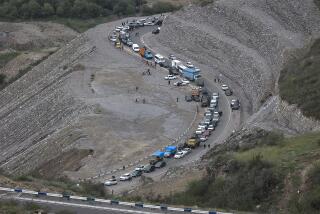Bosnia Factions Demobilize to Meet Accord Deadline
- Share via
SARAJEVO, Bosnia-Herzegovina — Bosnia’s armies were working Thursday to meet the final military deadline in the Dayton peace agreement, warehousing their tanks and missiles and sending their soldiers to barracks or home.
Up to 150,000 Muslim, Croatian and Serbian soldiers were being demobilized--half the number of troops who waged war during the past four years--and heavy weapons were being stored at 600 sites around the country.
“It means, in essence, that the war is over,” said British Maj. Simon Haselock, the spokesman for NATO’s peace implementation force in Bosnia-Herzegovina.
North Atlantic Treaty Organization officials said the formidable undertaking would not be completed by the midnight Thursday deadline. But senior NATO commanders said they have seen the intention of the three sides to comply, and that’s good enough for them.
“It’s very difficult, but they’re doing it,” U.S. Army Gen. William L. Nash, who commands the American sector in northeastern Bosnia, said in an interview. “They’re working hard every day on both sides” of the 600-mile line that divides Bosnia.
With the deadline, known as D-120 because it comes 120 days after NATO peacekeepers deployed in Bosnia, most military aspects of the peace accord aimed at stopping the war and separating the armies should be fulfilled. But equally daunting tasks toward rebuilding the country--from elections to the prosecution of war criminals--are barely underway.
The demobilization will send thousands of soldiers to the ranks of the unemployed, in a country where few people have work and per capita income has fallen to a fifth of what it was before the war. The World Bank, which is administering a $1.8-billion reconstruction plan in Bosnia, is designing a series of jobs-creation projects, including a public works program and the retraining of former soldiers, but none has yet come online.
At the Butila barracks in the formerly Serb-held outskirts of Sarajevo, the capital, a brigade of government soldiers was being housed in compliance with the D-120 provision of the peace accord hammered out in Dayton, Ohio. Soldiers who had chosen to leave the army were turning in their uniforms and equipment Thursday.
Samir, a 24-year-old squad commander with five years’ experience in the military, said he planned to stand down even if it meant giving up the salary and perks of the army. “I cannot wear this uniform and these boots anymore,” he said. “I am fed up with the army.”
Samir planned to look for a job, use his army discharge pay to buy a one-room apartment, and maybe marry his girlfriend, who he said is four months pregnant. “I just want to earn a good salary,” he said as he guarded the front gate of the barracks. “I don’t care what the work is.”
In addition to demobilizing and barracking troops, Bosnia’s three armies are storing more than 3,500 mortars, 1,300 artillery pieces and nearly 800 tanks as part of the peace agreement. Logistics, lack of transportation and fuel, and other problems have slowed compliance with the requirement, NATO officials said.
The factions were previously required to remove foreign fighters from their territory and free all prisoners of war. Those obligations have been only partially met. A NATO-enforced cease-fire has held for six months.
More to Read
Sign up for Essential California
The most important California stories and recommendations in your inbox every morning.
You may occasionally receive promotional content from the Los Angeles Times.













